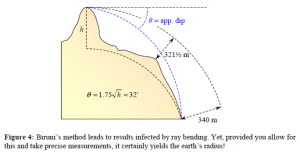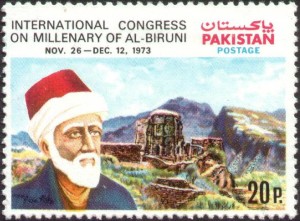Introduction
Al-Biruni is regarded as one of the greatest scholars of the medieval Islamic era, with significant contributions in the fields of physics, mathematics, astronomy, natural sciences, history, chronology, and linguistics. His full name was Abu al-Rehan Muhammad ibn Ahmad Al-Biruni, and he was born in Khwarezm (present-day Uzbekistan). He spent his first 25 years mastering Islamic jurisprudence, theology, grammar, mathematics, astronomy, medicine, and other sciences. Later, he traveled to various cities to expand his knowledge.
Scientific Work
Al-Biruni was a polymath who mastered many fields of study. He wrote 146 books, with 95 focused on astronomy, illustrating his significant contributions to this field. Although he was skeptical of certain astrological techniques of his time, he viewed astrology within the context of the science of astral influences in his Book of Instructions.
In the field of physics, Al-Biruni introduced experimental methods to mechanics, unified statics and dynamics into the science of mechanics, and created hydrodynamics by merging hydrostatics and dynamics. He accurately determined the Earth's radius at an observatory on a mountain in Pind Dadan Khan (Salt Range of Pakistan) and discovered the specific gravity of various minerals and metals using self-made apparatus.
He also translated numerous scientific works into Arabic, which were sought after by Europe in the 12th and 13th centuries. Al-Biruni traveled widely, studying different cultures and languages. His extensive study of India’s culture, religion, and philosophy is encapsulated in his book Indica, a comprehensive account of India's religious and philosophical traditions. He also learned Sanskrit to translate many Indian scientific works into Arabic.
Books
Al-Biruni wrote 146 books and translated many works into Arabic and Persian. Some of his notable works include:
- Kitab al Tafhim
- Indica – A compendium of India’s religion and philosophy
- The Book of Instruction in the Elements of the Art of Astrology
- The Remaining Signs of Past Centuries
- The Mas'udi Canon
- Understanding Astrology
- Pharmacy – A treatise on drugs and medicines
- Gems
- Astrolabe
- A Historical Summary Book
- History of Khwarezm
- Materia Medica
Al-Biruni is considered one of the greatest Muslim scientists and one of the greatest scientists of all time. His critical spirit, love for truth, and scientific approach were combined with a sense of tolerance. As Muslims, we can learn much from his life and contribute to the betterment of humanity by engaging in scientific research and study.



